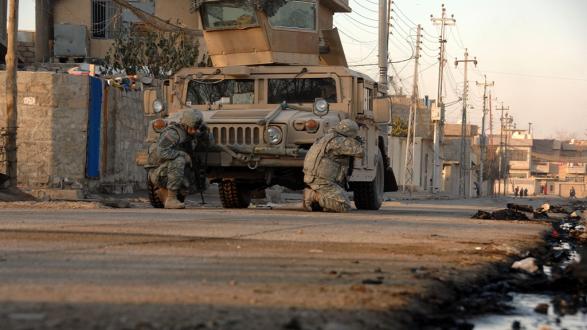In:
Global Beat is your weekly stop for news from around the world. Join us every Friday morning for important stories you should know about.
This week, the battle to retake Mosul is underway; India hosts the 8th BRICS Summit and shuns Pakistan; Burundi and South Africa quit the International Criminal Court; and more.
____________________
Americas
Venezuela’s National Electoral Council suspended the opposition's campaign to hold a recall referendum against President Nicholás Maduro and announced that elections for state governorships will be delayed from December until mid-2017. Regional elections of mayors have been pushed back until the end of 2017. The opposition is calling the move unconstitutional, and eight leaders of the opposition said they received court orders barring them from leaving the country. Maduro’s approval ratings have plummeted in recent months.
Also check out:
- Julian Assange was Ecuador’s guest of honor, until he wore out his welcome – Nick Miroff, Washington Post
Central & South Asia
India hosted the 8th BRICS Summit last weekend, featuring leaders from Brazil, Russia, India, China, and South Africa. Chinese media chided India for inviting all countries in the region to the summit except Pakistan, effectively consigning its neighbor as "a regional pariah," according to an article in the state-run Global Times. Bangladesh, Sri Lanka, Thailand, Myanmar, Nepal, and Bhutan were all invited to the summit. Next year’s BRICS Summit will be held in September 2017 in Xiamen, China.
Also check out:
- Pakistan has banned all Indian content from its airwaves – Ananya Bhattacharya, Quartz
China & East Asia
U.S. Secretary of State John Kerry promised Wednesday to deploy an advanced anti-missile system known as Terminal High Altitude Area Defense (THAAD), to South Korea "as soon as possible." North Korea and China have strongly protested the move. The announcement came after talks in Washington between Kerry, U.S. Secretary of Defense Ash Carter, and South Korean foreign and defense ministers. The countries also agreed to set up a high-level Extended Deterrence Strategy and Consultation Group to leverage "the full breadth of national power – including diplomacy, information, military coordination, and economic elements" in the face of the North Korean threat.
Also check out:
- PETA isn’t happy about that smoking chimp in North Korea – Andrew Katz, TIME
Europe & Russia
Two British warships shadowed a Russian aircraft carrier and seven other naval ships as they passed the United Kingdom via the English Channel on their way to Syria. The aircraft carrier has reportedly been operating fighter jets near the Orkney Isles as well as other drills to prepare their pilots for combat missions in Syria. British Defense Secretary Michael Fallon said, "When these ships near our waters we will man-mark them every step of the way. We will be watching as part of our steadfast commitment to keep Britain safe."
Also check out:
- Russia taunts U.S. with biggest military offensive since the Cold War – Ben Farmer, Barney Henderson, and Roland Oliphant, The Telegraph
Middle East & North Africa
Iraq’s campaign to retake Mosul from ISIL is currently underway. A brigadier general of the Iraqi Kurdish Peshmerga force said the liberation of the city could take two months or more. About 5,000 civilians have fled the city and crossed the border into Syria in the last 10 days. Up to 1.5 million civilians are thought to still be in Mosul, along with up to 5,000 ISIL fighters. ISIL leaders, however, have reportedly begun to flee the city. UN humanitarian chief Stephen O’Brien said the UN anticipates "a displacement wave of some 200,000 people over the coming weeks, with up to one million displaced in the course of the operation in a worst-case scenario." The United States also expects ISIL to use crude chemical weapons in the fight. Meanwhile, Kurdish fighters have launched a large-scale operation east and north of Mosul to oust ISIL.
Also check out:
- Assad claims photo of child in ambulance in Aleppo is fake – Associated Press
Southeast Asia & Oceania
A police vehicle continuously rammed into protesters in the Philippines on Wednesday during an anti-U.S. demonstration. Several people were hospitalized and arrested. Police also used tear gas on the protesters, who were calling for U.S. troops to leave the southern island of Mindanao, a move supported by President Rodrigo Duterte. Duterte was in China this week in an effort to strengthen relations at a time when relations with the United States have been deteriorating.
Also check out:
- Many in Thailand want the princess to ascend to the throne, but her scandal-plagued brother is next in line – Alexandra Zavis and Simon Roughneen, Los Angeles Times
Sub-Saharan Africa
Burundian President Pierre Nkurunziza signed a decree to quit the International Criminal Court immediately over a dispute about human rights in the country. However, the court’s rules state that any decision to withdraw becomes active one year after giving notice to the UN secretary general. Burundi is the first country to attempt to pull out of the court, which deals with high-level international crimes such as genocide and crimes against humanity. On Thursday, South Africa also notified the UN that it intends to withdraw from the court as well. Other African nations could follow suit.
Also check out:
- Why Uganda is one of the world’s most hospitable refugee destinations - Fred de Sam Lazaro, PBS NewsHour




